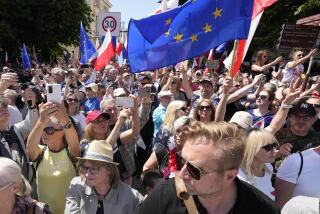Tadeusz Mazowiecki, Poland’s first post-communist premier, dies at 86
- Share via
Tadeusz Mazowiecki, 86, Eastern Europe’s first democratic prime minister after communism, a key advisor to Poland’s Solidarity freedom movement and U.N. human rights envoy to Bosnia in the 1990s, died Monday in Warsaw after being hospitalized for a high fever, said his personal secretary, Michal Prochwicz.
In August 1980, Mazowiecki joined thousands of workers on strike at the Gdansk Shipyard. Within days, their action grew into a massive wave of strikes that gave birth to Solidarity — Eastern Europe’s first free trade union and a nationwide freedom movement — led by a charismatic shipyard electrician, Lech Walesa, whose name quickly became known around the globe.
Mazowiecki, among Walesa’s closest counselors, advised him in the tough yet successful negotiations with the communists, who granted union and civic freedoms in 1980.
In a new wave of strikes in 1988, Mazowiecki walked arm in arm with Walesa at the head of angry workers in Gdansk. The renewed protests brought the communists to the negotiating table with Solidarity to discuss the terms of democratization. Mazowiecki was the author of many of these terms.
The outcome was Eastern Europe’s first partly free parliamentary election June 4, 1989, that gave Solidarity seats in Parliament and paved the way for the first democratic government in the cracking communist bloc. In September, Mazowiecki became the region’s first democratic prime minister. Poland’s peaceful revolution initiated changes in the region, climaxing in the fall of the Berlin Wall in November 1989.
His government was hastily composed of Solidarity backers, who were experts in their fields but had no government experience. Reforms were painful and Mazowiecki unexpectedly lost in the 1990 first free presidential election, which Walesa won in a runoff.
Mazowiecki was appointed the first U.N. envoy to war-torn Bosnia in 1992 and widely reported on atrocities there before resigning in 1995.
He was born in 1927 in the central city of Plock to a Catholic family. Under the Nazi German occupation of Poland during World War II, Mazowiecki worked as a messenger for a hospital and a trade company. He later studied law at Warsaw University and pursued journalism and politics.
More to Read
Start your day right
Sign up for Essential California for the L.A. Times biggest news, features and recommendations in your inbox six days a week.
You may occasionally receive promotional content from the Los Angeles Times.






